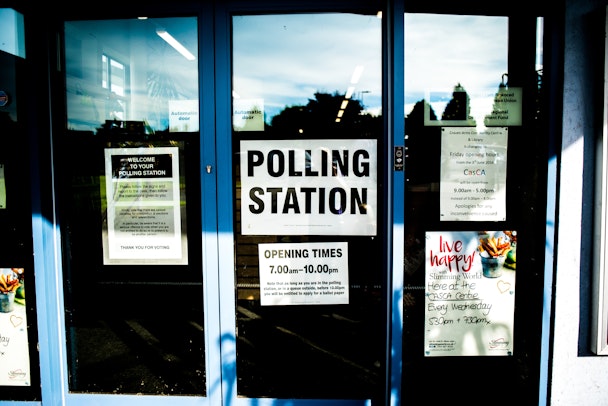Does Labour need a rebrand after Hartlepool? First it needs to get back to comms basics
Following Labour’s reverse in the Hartlepool by-election last week, columnist Kevin Chesters considers whether the party can apply lessons learned from the ad business to its campaign comms.

The Labour Party suffered defeat in the Hartlepool by-election
A lot has been written about the performance of Labour in last week’s elections, most of it hyperbolically focusing on the ’disaster’, and what now needs to radically be done to ’rebrand’ Labour to connect with the will of the British people.
Before I delve into what I think Labour needs to do from a branding and marketing perspective to get back to winning power, it is worth remembering some of the truth behind the (largely partisan) headlines of last week.
Firstly, the lesson for any brand, starting with Labour, is always to look at the context of any results. What else is going on around your campaign? The circumstances of a Covid-19 election are always going be somewhat anomalous, and there is clearly something of a vaccine bounce going on that the government is benefitting from. One of the best pieces of advice I ever got was to never make decisions with long-term consequences based on short-term circumstances. A good lesson for Labour.
Next, let’s look at Hartlepool. Perhaps it’s time to remember that the faultlines in UK politics were redrawn as Leave/Remain after 2016, and the old left/right thing is something of a red herring (no pun intended). Hartlepool voted to leave by 70% in 2016. It was one of the top 15 constituencies in the UK for the Leave vote. It was never going to vote for anyone but Johnson in our largely still two-party system.
Also, the ‘disastrous night’ saw pretty much all of the devolved mayoralties go to Labour, some like Andy Burnham with absolutely whopping majorities. Despite what The Daily Mail might be telling you, Sadiq Khan didn’t ‘sneak back’ or ‘struggle’ in London. Khan got the third-highest percentage of the vote in history – only beaten by his own win in 2016 and Livingstone in the first race in 2000. Labour absolutely crushed it in Wales. So, let’s firstly remember who is telling us the story of Labour’s demise, and the lesson of who seeks to gain most from telling it (cui bono).
But clearly from a standard communications or branding perspective, Starmer isn’t really crushing it. He’s not really getting the blood pumping, the heart racing, the knickers being thrown or the airhorns being blown. No one is cracking out the D:ream for him. So, what does Labour have to do? Sorry to go back to another ’90s reference but I think Starmer really needs to get ’back to basics’.
Now I don’t mean that he needs to borrow John Major’s laughable sleaze-soaked party behavior of the 1990s (we’ve got Johnson for that), but look at the 1.01 lesson of how one communicates anything.
Think of three things: purpose, proposition, package.
Purpose: back to basics. What do you stand for? OK, it’s hard to get a message out there when the majority of the traditional channels of communication are in the hands of your opponent – but that doesn’t stop you working on what it is, and clearly articulating it. It also doesn’t stop you developing the four or five behaviors or values that you expect off the back of that purpose. I was a literal card-carrying member of Labour Party for 25 years and I can’t really articulate what Starmer properly believes in. So why should anyone else? And make sure that it’s emotionally resonant. Stop overthinking it.
Proposition: again, basics. What’s the message? What’s the one-liner? What is the simple, repeatable promise that Labour is asking people to believe in? You might not like #LyingTed or #CrookedHillary but you remember it and boy, was it effective. Not being Jeremy Corbyn will work for a while, but it’s not a positive direction to ask people to buy into. And not being the Tories will work for hopeless lefties like me, but again it’s not really a ’Yes, we can’ or ’Things can only get better’ or ’Labour isn’t working’ to rally behind. And then repeat, repeat, repeat. Remember ’Get Brexit done’? I hated it. 42.4% of the British population didn’t. The Kantar data has always shown that ads with one message work better than ads with two or three. 30% of people can play back the main message of an ad with one message. This drops to 21% with two messages, and 14% with three. Basics!
Package: this is really the crux of it, and the unpalatable truth. But again, it is basics. We know as advertisers that it is not really what you say, it is how you say it that matters. We know from Kahneman and System 1 that people make decisions based on emotion first, logic second. We know from The Messenger Effect that we only really care far more about who is speaking than what is said.
What did Thatcher, Blair and Johnson all have in common? They emotionally connected with people. You could hate them, you could love them, but you couldn’t ignore them. They were icons, not politicians. The unfortunate truth is that personality matters more than policy. Manner matters more than manifesto. One thing Corbyn did was emotionally connect – just not positively with enough people. Policy wonks are clever but as my gran always told me, “you won’t get anywhere in this world being clever, our Kevin.”
Johnson isn’t ‘winning’ because of anything he’s saying. The smartest thing I heard this week was from a losing Labour politician who said: “People just like Boris.” He’s currently the second most popular politician in the country (after Rishi) according to YouGov. Even after all the deaths, cheating and expensive wallpaper. Maybe Starmer is just a bit... dull.
The weird thing is that we seem to suddenly and strangely forget everything we know to be true as marketers when we think about politics. We think that suddenly everyone wants a list of RTBs or that they will choose with their heads, not their hearts.
Decisions in politics are like decisions in supermarkets. Voters are the same as consumers. They all have one thing in common – they are all human beings. So they will act like human beings.
If Labour are to effectively connect, they need to get back to basics. Work out what they are about. Work out a simple way to say it. Say that one thing and keep saying it. But, most importantly, find someone likeable and emotionally resonant to say it. I hate to say it, but people like Boris. Until Labour find a messenger that people like just as much then I think all the clever policies and rational arguments won’t amount to anything.
And finally, just wait a bit. Times are, er, unprecedented. We’re in the middle of a rather unusual storm. So I would put their foot on the ball and take a little bit of an exhale.
Things can only get better.

